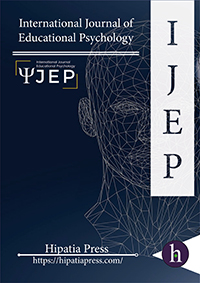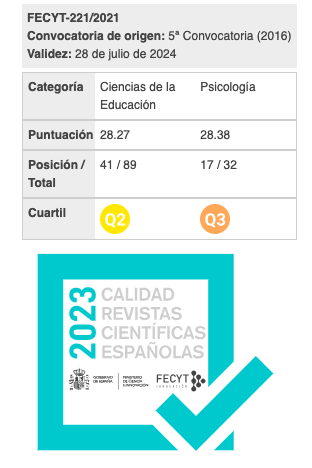Identity Formation in Adolescents with Concentration Problems, High Levels of Activity or Impulsiveness: A Pragmatic Qualitative Study
Keywords:
Downloads
Abstract
Students showing core symptoms of ADHD face additional challenges in school. This study asks how children and adolescents with inattentiveness, high levels of activity or impulsiveness perceive their symptom-like behaviour and how this may affect their identity, friendships and well-being. Researchers conducted individual interviews with 12 students (10–16 years) selected to attend a school programme aimed at improving their concentration. Six students had an ADHD diagnosis. The interviews were analysed, guided by theoretical reading. The students’ narratives fit a discursive perspective showing that identity developed through interactions with others. All students told about their disturbing concentration problems. Students disliked having a short fuse and talking before thinking, and they admitted that impulsive behaviour could threaten their friendships. On the other hand, students with high levels of activity described this as fun in interaction with friends. Nobody mentioned that concentration problems affected friendships, and none of the core symptoms seemed to influence well-being. There were no obvious differences between students with or without an ADHD diagnosis. The students’ stories, therefore, show that teachers should know their students with inattentiveness, hyperactivity or impulsiveness individually to learn about their challenges and preferences.
Downloads
References
Bakken, A. (2018). Ungdata. Nasjonale resultater 2018. NOVA Rapport 8/18. Retrieved from: http://www.hioa.no/Om-OsloMet/Senter-for-velferds-og-arbeidslivsforskning/NOVA/Publikasjonar/Rapporter/2018/Ungdata-2018.-Nasjonale-resultater
Google Scholar CrossrefBecker, S. P., Luebbe, A. M., & Langberg, J. M. (2012). Co-occurring mental health problems and peer functioning among youth with attention-deficit/hyperactivity disorder: a review and recommendations for future research. Clin Child Fam Psychol Rev, 15(4), 279–302. doi:10.1007/s10567-012-0122-y
Google Scholar CrossrefBlumer, H., & Morrione, T. J. (2004). George Herbert Mead and human conduct. Walnut Creek, CA: Alta Mira Press.
Google Scholar CrossrefBrinkman, W. B., Sherman, S. N., Zmitrovich, A. R., Visscher, M. O., Crosby, L. E., Phelan, K. J., & Donovan, E. F. (2012). In their own words: Adolescent views on ADHD and their evolving role managing medication. Acad Pediatr, 12(1), 53–61. doi:10.1016/j.acap.2011.10.003
Google Scholar CrossrefBrinkmann, S., & Kvale, S. (2015). Interviews: Learning the craft of qualitative research interviewing (3rd ed.). Los Angeles: SAGE.
Google Scholar CrossrefCranston, J. (2011). Relational trust: The glue that binds a professional learning community. Alberta Journal of Educational Research, 57(1), 59–72.
Google Scholar CrossrefEmilsson, M., Gustafsson, P. A., Ohnstrom, G., & Marteinsdottir, I. (2017). Beliefs regarding medication and side effects influence treatment adherence in adolescents with attention deficit hyperactivity disorder. Eur Child Adolesc Psychiatry, 26(5), 559–571. doi:10.1007/s00787-016-0919-1
Google Scholar CrossrefGadamer, H.-G. (1999). Friendship and self-knowledge: Reflections on the role of friendship in Greek ethics. In H.-G. Gadamer (Ed.), Hermeneutics, religion, and ethics (pp. 119–127). New Haven, CT: Yale University Press.
Google Scholar CrossrefGardner, D. M., & Gerdes, A. C. (2015). A review of peer relationships and friendships in youth with ADHD. J Atten Disord, 19(10), 844–855. doi:10.1177/1087054713501552
Google Scholar CrossrefGau, S. S., Lin, Y. J., Shang, C. Y., Liu, S. K., Chiu, Y. N., & Soong, W. T. (2010). Emotional/behavioral problems and functional impairment in clinic- and community-based children with attention-deficit/hyperactivity disorder in Taiwan. J Abnorm Child Psychol, 38(4), 521–532. doi:10.1007/s10802-009-9381-6
Google Scholar CrossrefGee, J. P. (2000). Chapter 3: Identity as an Analytic Lens for Research in Education. Rev Res Educ, 25(1), 99–125. doi:10.3102/0091732x025001099
Google Scholar CrossrefGregory, A., & Ripski, M. B. (2008). Adolescent trust in teachers: Implications for behavior in the high school classroom. School Psychology Review, 37(3), 337–353.
Google Scholar CrossrefHoza, B. (2007). Peer functioning in children with ADHD. Ambul Pediatr, 7(1 Suppl), 101–106. doi:10.1016/j.ambp.2006.04.011
Google Scholar CrossrefKaidar, I., Wiener, J., & Tannock, R. (2003). The attributions of children with Attention-Deficit/ Hyperactivity Disorder for their problem behaviors. J Atten Disord, 6(3), 99–109. doi:10.1177/108705470300600302
Google Scholar CrossrefKendall, J., Hatton, D., Beckett, A., & Leo, M. (2003). Children's accounts of Attention-Deficit/Hyperactivity Disorder. Advances in Nursing Science, 26(2), 114–130. doi:10.1097/00012272-200304000-00004 12795540
Google Scholar CrossrefKlimkeit, E., Graham, C., Lee, P., Morling, M., Russo, D., & Tonge, B. (2006). Children should be seen and heard: Self-report of feelings and behaviors in primary-school-age children with ADHD. J Atten Disord, 10, 2. 181–191. doi:10.1177/1087054706289926
Google Scholar CrossrefMarton, I., Wiener, J., Rogers, M., & Moore, C. (2015). Friendship characteristics of children with ADHD. J Atten Disord, 19(10), 872–881. doi:10.1177/1087054712458971
Google Scholar CrossrefMcQuade, J. D., Vaughn, A. J., Hoza, B., Murray-Close, D., Molina, B. S., Arnold, L. E., & Hechtman, L. (2014). Perceived social acceptance and peer status differentially predict adjustment in youth with and without ADHD. J Atten Disord, 18(1), 31–43. doi:10.1177/1087054712437582
Google Scholar CrossrefMonahan, K. C., Oesterle, S., & Hawkins, J. D. (2010). Predictors and consequences of school connectedness: The case for prevention. The Prevention Researcher, 17(3), 3–6.
Google Scholar CrossrefMukherjee, S., Shah, H. R., Ramanathan, S., & Dewan, M. (2016). Knowledge and attitudes about Attention-Deficit/Hyperactivity Disorder and Specific Learning Disorder in an urban Indian population. J Nerv Ment Dis, 204(6), 458–463. doi:10.1097/NMD.0000000000000524
Google Scholar CrossrefSalkind, N. J. (2012). Pragmatic Study. In L. A. Duram (Ed.), Encyclopedia of research desig.n Thousand Oaks, CA: SAGE Publications, Inc
Google Scholar CrossrefSamdal, O., Nutbeam, D., Wold, B., & Kannas, L. (1998). Achieving health and educational goals through schools: A study of the importance of the school climate and the students' satisfaction with school. Health Education Research, 13(3), 383–397. doi:10.1093/her/13.3.383
Google Scholar CrossrefSilk, J. B. (2003). Cooperation without counting: The puzzle of friendship. In P. Hammerstein (Ed.), Genetic and Cultural Evolution of Cooperation (pp. 37–54). Cambridge, MA: The MIT Press.
Google Scholar CrossrefTarver, J., Daley, D., & Sayal, K. (2014). Attention-deficit hyperactivity disorder (ADHD): An updated review of the essential facts. Child Care Health Dev, 40(6), 762–774. doi:10.1111/cch.12139
Google Scholar CrossrefTegtmejer, T. (2018). ADHD in the interactional context of children's cultures: A sociocultural critique of the individualizing gaze of the diagnosis. Learning, Culture and Social Interaction, 17, 79–89. doi:https://doi.org/10.1016/j.lcsi.2018.01.001
Google Scholar CrossrefWiener, J., Malone, M., Varma, A., Markel, C., Biondic, D., Tannock, R., & Humphries, T. (2012). Children's perceptions of their ADHD symptoms: Positive illusions, attributions, and stigma. Canadian Journal of School Psychology, 27(3), 217–242. doi:10.1177/0829573512451972
Google Scholar CrossrefWong, I. Y. T., Hawes, D. J., Clarke, S., Kohn, M. R., & Dar-Nimrod, I. (2018). Perceptions of ADHD among diagnosed children and their parents: A systematic review using the common-sense model of illness representations. Clin Child Fam Psychol Rev, 21(1), 57–93. doi:10.1007/s10567-017-0245-2
Google Scholar CrossrefØksnes, M. (2015). "You don't have to have an internalized conception of friendship to actually be a friend": Interview with William A. Corsaro. In M. Øksnes & A. Greve (Eds.), Barndom i barnehagen. Vennskap (pp. 161–174). Oslo: Cappelen Damm AS.
Google Scholar CrossrefDownloads
Published
Almetric
Dimensions
How to Cite
Issue
Section
License
All articles are published under Creative Commons copyright (CC BY). Authors hold the copyright and retain publishing rights without restrictions, but authors allow anyone to download, reuse, reprint, modify, distribute, and/or copy articles as the original source is cited.
















